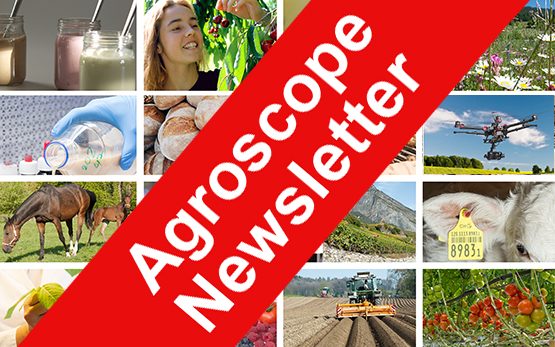EUCARPIA Congress at ETH Zurich: Plant Breeding as both Art and Science
Zurich, 29.08.2016 - A good 400 researchers from the future-oriented field of plant breeding will meet this week at the 20th EUCARPIA General Congress in Zurich, organised by Agroscope and ETH Zurich. Practical plant breeders as well as scientists from the emergent disciplines of molecular genetics, bioinformatics and measurement techniques summarised under the term ‘phenomics’ are searching for ways to breed new, improved plant varieties for a sustainable agricultural sector.
“Plant breeding plays a crucial role in ensuring sustainable, high-quality and efficient plant production” declares Beat Boller, a scientist at Agroscope and President of the European Association for Research on Plant Breeding EUCARPIA, on the occasion of the organisation’s general congress at the ETH in Zurich. A growing global population’s increasing demand for healthy food calls for improved plant varieties. The art of combining the appropriate genetic material for this purpose is supported by scientific findings to corroborate selection decisions. New technological tools and the rapid development of molecular genetics, bioinformatics and the measuring techniques summarised under the term ‘phenomics’ have lent a new dimension to the interaction of art and science in plant breeding. A clear understanding of the requirements that a new plant variety must meet is essential to enable the profitable use of the new tools in this sphere.
Reorientation of Breeding Objectives
Climate change, the increasing scarcity of resources and the need to preserve biodiversity are bringing about a reorientation of breeding objectives. The different disciplines must cooperate closely in order to translate scientific advances into new, improved plant varieties. That’s why the motto of the EUCARPIA General Congress is ‘Plant breeding: the art of bringing science to life’. Using this platform, we explore ways of incorporating technological advances and rapidly expanding knowledge on the fundamentals of genetics into breeding processes in order to specifically create new varieties with the desired traits.
The four-day EUCARPIA General Congress has been jointly organised by ETH Zurich and Agroscope. Twelve renowned scientists from Europe, America, Asia and Australia have been secured for each main lecture. Well over 300 further high-quality contributions have allowed a good selection of presentations. The plenary sessions will encompass a wide range of topics: from stress tolerance, to secondary metabolites, to the importance of genetic resources on the one hand and of the interaction of plants and microorganisms on the other – all with the common objective of improved plant varieties. Exchange among the experts on individual crop species will also be given its due: cutting-edge results and breeding concepts will be presented and discussed in parallel lecture sessions and in the form of challenging flash presentations and posters. A selection of attractive excursions will offer a better understanding of diverse Switzerland with its multifunctional agricultural sector and plant-breeding institutions to the more than 400 participants from 51 nations. The congress will conclude with a podium discussion on the legal and organisational framework for plant breeding. How can plant breeding be regulated so as to protect utilisation of the investments in a new variety without limiting innovation in the field of plant breeding?
International Standards
Organising the congress is an opportunity to assess the achievements of native Swiss plant-breeding research and variety development against international standards. Agroscope and ETH Zurich rise to this challenge with numerous contributions of their own. The promotion of plant breeding as an important element in addressing the major future challenges of food security in times of climate change is both a regional and universal concern.
Plant Breeding at Agroscope
Agroscope conducts internationally successful breeding programmes for grains, fodder plants, fruit, grapevines, and medicinal and aromatic plants. New, improved varieties that are geared to the specific demands of Swiss agriculture are a highly efficient means of directly implementing the results of research and development work in practice. That Agroscope has been entrusted with organising the EUCARPIA General Congress is not least of all a striking sign of the Europe-wide recognition of the achievements of Swiss plant breeding. In organising the congress, Agroscope has joined forces with the ETH Zurich chairs in Crop Science and Molecular Plant Breeding. A strong link between academic plant-sciences research at ETH Zurich and the implementation at Agroscope of this research in practical breeding programmes leading to marketable varieties offers unique opportunities for addressing the pressing challenges of the future. The offices of the European Association for Research on Plant Breeding EUCARPIA have been at Agroscope’s Reckenholz site in Zurich since 2012, and will remain there until the end of 2016.
Address for enquiries
Beat Boller, Fodder Plant Breeding Research Group and President of EUCARPIA
Agroscope, Institute for Sustainability Sciences ISS
Reckenholzstrasse 191, 8046 Zurich, Switzerland
beat.boller@agroscope.admin.ch
+41 58 468 73 63
Ania Biasio, Media Service
Corporate Communication Agroscope
Reckenholzstrasse 191, 8046 Zurich, Switzerland
ania.biasio@agroscope.admin.ch
+41 58 468 72 74
www.agroscope.ch | Good food, healthy environment
Publisher
AGROSCOPE
http://www.agroscope.admin.ch






